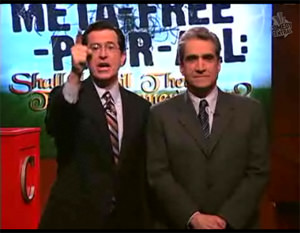Psychology, Metaphors and You
Can you tell your metaphors from your synecdoches? These terms may trigger bad freshman English flashbacks, but at least when it comes to metaphors, they're more important than you might think; in fact, they might just be intrinsic to how you think.
Can you tell your metaphors from your synecdoches? These terms may trigger bad freshman English flashbacks, but at least when it comes to metaphors, they’re more important than you might think; in fact, they might just be intrinsic to how you think. –KA
The Boston Globe via Arts & Letters Daily:
Now, however, a new group of people has started to take an intense interest in metaphors: psychologists. Drawing on philosophy and linguistics, cognitive scientists have begun to see the basic metaphors that we use all the time not just as turns of phrase, but as keys to the structure of thought. By taking these everyday metaphors as literally as possible, psychologists are upending traditional ideas of how we learn, reason, and make sense of the world around us. The result has been a torrent of research testing the links between metaphors and their physical roots, with many of the papers reading as if they were commissioned by Amelia Bedelia, the implacably literal-minded children’s book hero. Researchers have sought to determine whether the temperature of an object in someone’s hands determines how “warm” or “cold” he considers a person he meets, whether the heft of a held object affects how “weighty” people consider topics they are presented with, or whether people think of the powerful as physically more elevated than the less powerful.
What they have found is that, in fact, we do. Metaphors aren’t just how we talk and write, they’re how we think. At some level, we actually do seem to understand temperament as a form of temperature, and we expect people’s personalities to behave accordingly. What’s more, without our body’s instinctive sense for temperature–or position, texture, size, shape, or weight–abstract concepts like kindness and power, difficulty and purpose, and intimacy and importance would simply not make any sense to us. Deep down, we are all Amelia Bedelia.
Here, Stephen Colbert, Sean Penn and renowned poet Robert Pinsky make a strong case for the paramount importance of the metaphor in this classic “Colbert Report” clip:
| The Colbert Report | Mon – Thurs 11:30pm / 10:30c | |||
| Meta-Free-Phor-All: Shall I Nail Thee to a Summer’s Day? | ||||
|
||||
Independent journalism is under threat and overshadowed by heavily funded mainstream media.
You can help level the playing field. Become a member.
Your tax-deductible contribution keeps us digging beneath the headlines to give you thought-provoking, investigative reporting and analysis that unearths what's really happening- without compromise.
Give today to support our courageous, independent journalists.






You need to be a supporter to comment.
There are currently no responses to this article.
Be the first to respond.